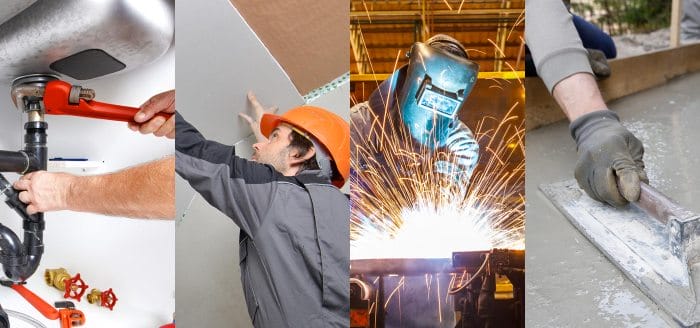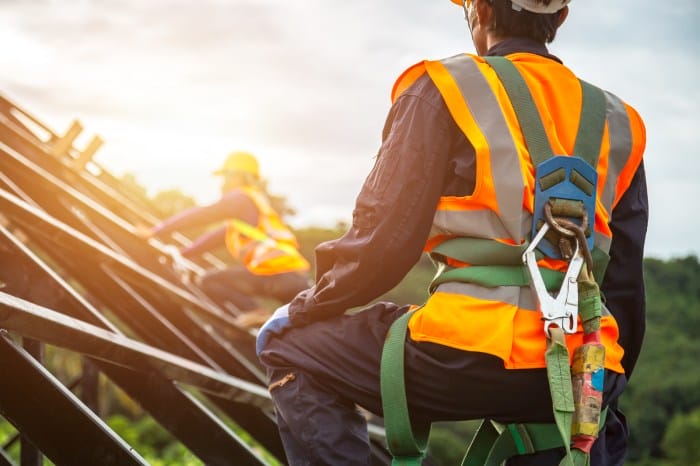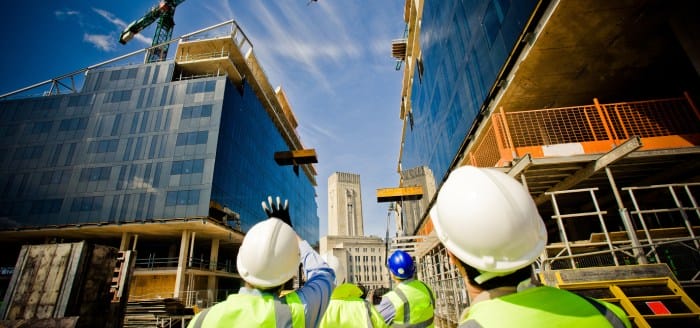In the dynamic and demanding world of construction, navigating the intricacies of insurance can be a daunting task. With numerous risks and liabilities inherent in the industry, having a comprehensive understanding of construction trades insurance is paramount. This article delves into the various types of insurance coverage available, providing valuable insights and practical tips to help construction businesses protect their assets, employees, and projects.
From general liability insurance that shields against property damage and bodily injury claims to property insurance that safeguards buildings, equipment, and materials, we explore the essential elements of a robust insurance portfolio. Additionally, we delve into workers’ compensation insurance, ensuring injured workers receive the necessary support and benefits.
Surety bonds, commercial auto insurance, inland marine insurance, and umbrella insurance are also thoroughly examined, providing a comprehensive overview of the insurance landscape in the construction industry.
General Liability Insurance

General liability insurance provides crucial protection for construction businesses against claims of property damage or bodily injury caused during operations. It acts as a safety net, shielding contractors from financial losses and ensuring their continued viability.
Coverage Offered
General liability insurance offers comprehensive coverage for various scenarios, including:
- Property Damage: Coverage for damages to third-party property, including buildings, equipment, or materials, resulting from the contractor’s activities.
- Bodily Injury: Coverage for injuries sustained by individuals, including customers, employees, or passersby, due to the contractor’s negligence or faulty workmanship.
- Legal Defense: Coverage for legal expenses incurred in defending against lawsuits, regardless of the outcome of the case.
- Medical Payments: Coverage for medical expenses of injured individuals, irrespective of who is at fault.
Property Insurance

Property insurance is a crucial coverage for construction trades businesses, as it safeguards their physical assets and properties from unforeseen events. It provides financial protection against losses or damage to buildings, equipment, and materials, enabling businesses to recover and continue operations without significant financial setbacks.
Property insurance typically covers a wide range of potential risks and perils, including fire, theft, vandalism, natural disasters, and other covered events as specified in the policy. It ensures that businesses can repair or replace damaged assets, maintain productivity, and fulfill contractual obligations without facing severe financial consequences.
Coverage for Buildings
Property insurance for construction trades businesses includes coverage for buildings and structures. This coverage protects the physical structures where the business operates, such as offices, warehouses, workshops, and job sites. It provides financial assistance to repair or rebuild damaged buildings, ensuring that the business has a functional and safe workspace.
Coverage for Equipment and Materials
Property insurance also covers equipment and materials used in construction projects. This includes tools, machinery, vehicles, and building materials. The coverage provides financial protection against loss or damage to these assets due to covered events. It ensures that businesses can replace or repair damaged equipment and materials, minimizing disruptions to ongoing projects and maintaining productivity.
Workers’ Compensation Insurance
Workers’ compensation insurance is a mandatory form of insurance that provides financial protection to employees who suffer injuries or illnesses as a result of their employment. This insurance is designed to cover medical expenses, lost wages, and other related costs associated with work-related injuries or illnesses.
Workers’ compensation insurance offers several benefits to injured workers and their families, including:
- Medical Expenses: Workers’ compensation insurance covers the costs of medical treatment, including doctor visits, hospital stays, surgeries, and prescription drugs. This coverage helps ensure that injured workers receive the necessary medical care to recover from their injuries or illnesses.
- Lost Wages: Workers’ compensation insurance provides income replacement benefits to injured workers who are unable to work due to their injuries or illnesses. These benefits help replace a portion of the wages that the injured worker would have earned if they were able to work.
- Vocational Rehabilitation: Workers’ compensation insurance may also provide vocational rehabilitation benefits to help injured workers return to work or find new employment if they are unable to return to their previous job. These benefits may include job training, job placement assistance, and other support services.
- Death Benefits: In the event of a work-related death, workers’ compensation insurance provides death benefits to the surviving spouse and/or dependents of the deceased worker. These benefits help provide financial support to the family during this difficult time.
Surety Bonds

Surety bonds are legal agreements that guarantee the fulfillment of a contract between two parties. They play a vital role in construction projects, providing financial protection to the project owner, contractor, and subcontractors.Surety bonds ensure that the contractor will complete the project according to the agreed-upon terms and conditions.
If the contractor fails to meet their obligations, the surety company will step in to complete the project or pay for the costs incurred by the project owner.
Commercial Auto Insurance

Commercial auto insurance plays a crucial role in protecting construction businesses and their operations. It covers vehicles used in construction activities, such as trucks, vans, and other specialized equipment, ensuring financial protection against various risks and liabilities.Commercial auto insurance typically includes coverage for:
- Liability Coverage: This coverage protects the construction business against legal liability arising from accidents involving its vehicles, including bodily injury and property damage caused to others.
- Collision Coverage: This coverage reimburses the business for damages to its vehicles resulting from collisions with other objects, regardless of who is at fault.
- Comprehensive Coverage: This coverage provides protection against damages to vehicles caused by events other than collisions, such as theft, vandalism, fire, hail, and natural disasters.
- Medical Payments Coverage: This coverage helps pay for medical expenses incurred by the driver or passengers of the insured vehicle in the event of an accident, regardless of who is at fault.
- Uninsured/Underinsured Motorist Coverage: This coverage protects the construction business in case of accidents involving uninsured or underinsured drivers, ensuring compensation for damages and injuries.
By obtaining commercial auto insurance, construction businesses can safeguard their assets, protect themselves from financial losses, and comply with legal requirements.
Inland Marine Insurance

Inland marine insurance is a type of insurance that covers construction equipment and materials while they are being transported. It is designed to protect businesses from the financial losses that can occur if their equipment or materials are damaged, lost, or stolen while in transit.
Inland marine insurance policies can be tailored to meet the specific needs of a construction business. They can cover a wide range of equipment and materials, including tools, machinery, supplies, and even the vehicles used to transport them.
Benefits of Inland Marine Insurance
- Protects against financial losses: Inland marine insurance can help businesses recover the costs of replacing or repairing damaged or lost equipment and materials.
- Provides peace of mind: Knowing that their equipment and materials are insured can give construction businesses peace of mind, allowing them to focus on their work without worrying about the financial impact of a loss.
- Helps businesses comply with contracts: Many construction contracts require businesses to carry inland marine insurance. Having this insurance can help businesses meet these contractual obligations.
Umbrella Insurance

Umbrella insurance extends the limits of liability coverage for construction trades businesses beyond the limits of primary insurance policies, providing additional protection against catastrophic losses.
In the construction industry, where risks are often substantial and projects can be complex, umbrella insurance acts as a safety net, ensuring that businesses are adequately covered in the event of a major claim or lawsuit.
Additional Coverage Provided by Umbrella Insurance
- Expanded Liability Limits: Umbrella insurance increases the limits of liability coverage above the limits of primary policies, offering broader protection against financial losses.
- Excess Coverage: Umbrella insurance covers losses that exceed the limits of underlying policies, preventing gaps in coverage and ensuring comprehensive protection.
- Defense Costs: Umbrella insurance covers legal defense costs, including attorney fees, court costs, and other expenses incurred in defending against claims.
- Claims Not Covered by Primary Policies: Umbrella insurance may provide coverage for claims that are not covered by primary policies, such as punitive damages, certain types of bodily injury, or property damage.
- Multiple Claims: Umbrella insurance can respond to multiple claims or lawsuits simultaneously, providing a single source of coverage for complex and costly situations.
Risk Management Strategies
In the construction trades, risk management is crucial for minimizing the likelihood and severity of accidents and claims. Effective risk management strategies can protect workers, property, and financial assets, leading to a safer and more profitable work environment.
To effectively manage risks in construction, consider the following strategies:
Identify and Assess Risks
Regularly conduct thorough risk assessments to identify potential hazards and vulnerabilities in your construction operations. Evaluate the likelihood and potential severity of each risk to prioritize risk mitigation efforts.
Develop and Implement Safety Programs
Establish comprehensive safety programs that Artikel specific procedures and protocols for all aspects of construction work. These programs should include regular safety inspections, training for workers, and clear guidelines for hazard prevention and control.
Provide Proper Training and Education
Ensure that all workers receive adequate training and education on safety procedures, equipment operation, and emergency response protocols. Regularly update training materials to reflect changes in regulations, industry best practices, and specific project requirements.
Maintain a Safe Work Environment
Implement measures to maintain a safe work environment, including proper maintenance of equipment, regular inspections of work areas, and the use of personal protective equipment (PPE) by workers. Regularly monitor compliance with safety regulations and standards.
Establish an Incident Reporting System
Create a system for workers to report incidents, accidents, and near-misses. Encourage a culture of open reporting to identify potential hazards and take corrective actions before incidents occur.
Conduct Regular Safety Audits
Schedule regular safety audits to assess the effectiveness of your risk management strategies. Identify areas for improvement, address any deficiencies, and update your risk management plan accordingly.
Stay Updated on Industry Regulations and Standards
Keep up-to-date with the latest industry regulations, standards, and best practices related to construction safety. Ensure that your risk management strategies align with these requirements and adapt your practices accordingly.
Involve Workers in Risk Management
Encourage workers to participate in the development and implementation of risk management strategies. Their insights and experiences can help identify potential hazards and develop effective control measures.
Claims Handling Procedures

Construction trades involve various risks, making insurance claims handling a crucial aspect of managing potential losses. Understanding the process and adhering to specific steps ensures prompt resolution and compensation for damages or losses.
Reporting a Claim
When an incident occurs, it is essential to report the claim promptly to the insurance company. The policyholder should contact their insurance agent or carrier directly to initiate the claims process. Delays in reporting may affect the validity and processing of the claim.
Documentation and Evidence Gathering
Thorough documentation is vital for successful claims handling. The policyholder should gather relevant documents, including:
- Insurance policy details and coverage information
- Incident reports, police reports, and witness statements
- Photographs and videos of the damage or loss
- Invoices and receipts for repairs or replacements
- Medical records and documentation (for workers’ compensation claims)
Assessment and Investigation
Upon receiving the claim, the insurance company assigns an adjuster to evaluate the claim. The adjuster conducts an investigation, reviews the submitted documents, and assesses the extent of damages or losses. The adjuster may also inspect the property or site where the incident occurred.
Settlement and Compensation
Based on the assessment and investigation findings, the insurance company determines the claim settlement amount. The policyholder is notified of the settlement offer, and negotiations may occur to reach a mutually agreeable resolution. Once the settlement is agreed upon, the insurance company disburses the compensation to the policyholder or designated beneficiaries.
Appeals and Disputes
In some cases, the policyholder may disagree with the settlement offer or the insurance company’s decision. They can file an appeal or pursue legal action to resolve the dispute. However, it is essential to exhaust all internal appeals processes before resorting to legal action.
Closure

In conclusion, navigating the complexities of construction trades insurance requires a proactive approach, informed decision-making, and a commitment to risk management. By understanding the different types of insurance coverage available, implementing effective risk management strategies, and following proper claims handling procedures, construction businesses can mitigate risks, protect their assets, and ensure the well-being of their employees.
Embracing these essential news and tips will empower construction professionals to confidently navigate the challenges of their industry, fostering a safer and more secure environment for all.
Questions and Answers
What are the key considerations when choosing a construction trades insurance policy?
When selecting a construction trades insurance policy, careful consideration should be given to the specific risks associated with your business, the coverage limits required, and the reputation and financial stability of the insurance provider.
How can construction businesses minimize the likelihood and severity of accidents and claims?
Implementing comprehensive risk management strategies, conducting regular safety inspections, providing thorough training to employees, and maintaining a culture of safety awareness are effective measures to minimize the occurrence and impact of accidents and claims.
What steps should be taken when filing an insurance claim in the construction industry?
Promptly notify your insurance provider about the incident, thoroughly document the details of the claim, gather relevant evidence, and cooperate with the insurance adjuster throughout the claims process to ensure a smooth and efficient resolution.



